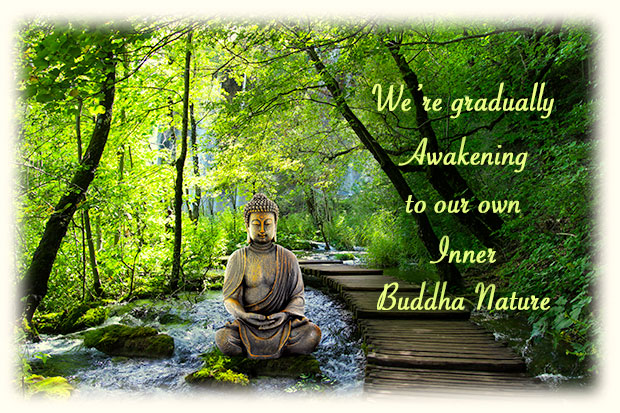

What's the Noble Eightfold Path?
The Noble Eightfold Path is basically "a formula for living", which is composed of 8 aspects (symbolized by the 8 spoked "Dharma Wheel").

In a sense, there are two stages for each of the 8 aspects or "Elements" of the Eightfold Path. The "first" or preliminary stage occurs when one first learns about it and begins trying to live according to it's precepts. It's kind of an introductory stage. But over time, as one gradually progresses on the journey towards enlightenment, we gradually begin to enter the higher stage or stages. It's sort of an ongoing process of gaining ever greater self-mastery and experiencing ever greater inner peace, happiness and contentment as we progress on the path of enlightenment.
So What Are These 8 Elements of the Noble 8- Fold Path?
We'll list them in order and give a brief explanation. You can examine some of them in greater depth simply by clicking on the "more . . . " option:
The Noble Eightfold Path
1) Right View (or Right Understanding)
Being able to see and understand how selfish desires and attachments are the real, underlying cause of most of our suffering in life. And how by letting go of selfish desires and attachments we can gradually begin acquiring true and lasting spiritual happiness. (Essentially, it means understanding the implications of the Four Noble Truths.)
 2) Right Intention (Being Sincere & Committed)
2) Right Intention (Being Sincere & Committed)
Consciously and sincerely renouncing our selfish desires and attachments, as well as sincerely committing ourselves to a selfless life of loving kindness, compassion, helpfulness, goodwill and harmlessness towards others. The emphasis here is on sincerely making a commitment and following through with our good intentions. It's one of the most important steps of all because little can be achieved without sincerity.
3) Right Speech (Saying nothing that might hurt others.)
Speaking kindly, compassionately & truthfully in a gentle, friendly way that brings people together in harmonious cooperation, while refraining from lies, gossip, idle chatter, or speech that pits one person or group against another or causes problems in society. Thus, it is important to use words that are pleasant, honest, caring, sincere, meaningful, diplomatic and helpful which help to bring people and groups together in loving harmony.
4) Right Action
Acting only in wholesome, beneficial ways while being careful not to harm anyone.
5) Right Livelihood (Work for the good of others)
Choosing a job or profession that only has beneficial effects for humanity and no harmful ones.
6) Right Effort (Making a sincere effort)
This is all about the need for making an effort. We need to actually make an effort to think, feel, speak and act from a consciousness of loving kindness, compassion, selflessness, harmlessness and non-attachment, if we're going to succeed in attaining our spiritual goals.  It won't happen all by itself. And wishful thinking is not enough. We'll only succeed, if we make a sincere effort. Likewise, we need to make a sincere effort to avoid unkind, selfish, harmful, self-destructive thoughts, feelings, words and actions. In other words, the only way we're going to gradually awaken into the inner peace and happiness of our inner "Buddha Nature" is if we make a genuine, sincere effort to actually act in ways that generates good karma both for oneself and others, including families, businesses and society in general.
It won't happen all by itself. And wishful thinking is not enough. We'll only succeed, if we make a sincere effort. Likewise, we need to make a sincere effort to avoid unkind, selfish, harmful, self-destructive thoughts, feelings, words and actions. In other words, the only way we're going to gradually awaken into the inner peace and happiness of our inner "Buddha Nature" is if we make a genuine, sincere effort to actually act in ways that generates good karma both for oneself and others, including families, businesses and society in general.
7) Right Mindfulness (Quiet Awareness)
Mindfulness is a huge part of Buddhist practice. It is the ability to be aware of that peaceful feeling flowing from our heart chakras, as well as dwelling within this peace, while being unaffected by the anxious thoughts and hurries & worries, and selfish desires and attachments that arise in our mind and emotional world. When these distractions do arise, all we need to do is simply stay in this peaceful unaffected place within our heart chakra while simply observing them without being disturbed by them. In other words, we just ignore the anxious thoughts and feelings, without either fighting them nor getting "pulled into them". Thus, mindfulness means being able to stay in that soft, sweet, peaceful place of the heart, while remaining unaffected by our human thoughts and emotions, or the adversities of human life and its problems, challenges and fears. In one sense we just, "rest serene in the center of our being" whether we're meditating or going about the normal activities of our day.
The Buddha taught that the correct practice of "Right Mindfulness" is essential for liberation.
More about: #7 Right Mindfulness
8) Right Concentration ("Relaxing Our Thoughts")
This is another way of quieting the mind. Our gentle goal is a relaxed, but highly focused mind that remains mindful and alert. It involves a relaxing and yet highly focused, one-pointed awareness of an "object of concentration", which in turn results in a quiet, peaceful state of equanimity. The object of concentration might involve concentrating on an image of the Buddha; focusing ones' attention on a flower; visualizing the Light within one's own Heart Chakra; or whatever. Generally, the more relaxed we are, the better will be our quality of concentration.
More about: #8 Right Concentration
* * *
* * *
Back to the Buddha's Path Table of Contents
* * *
Copyright 2020 Bill Gaum All Rights Reserved
